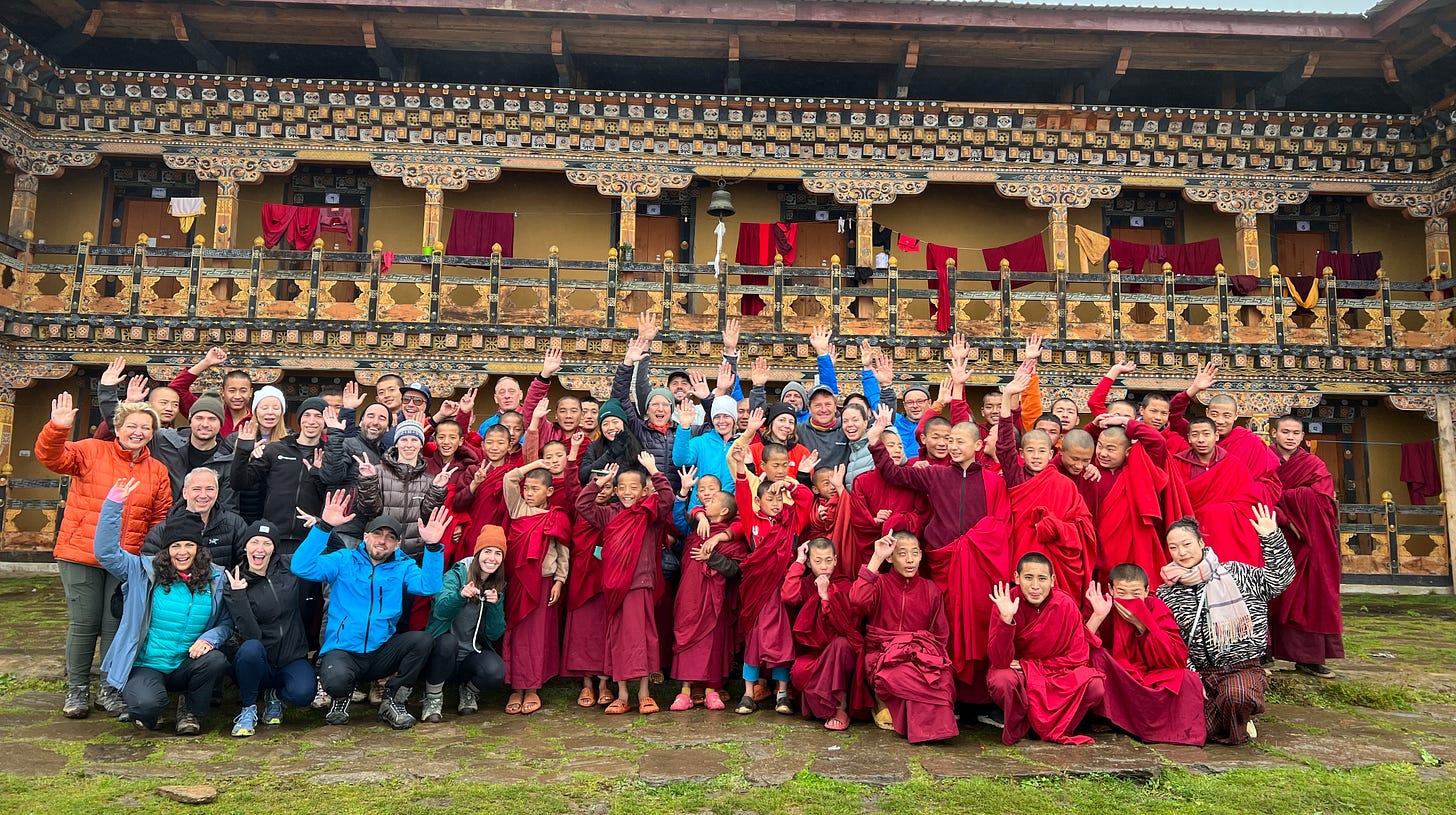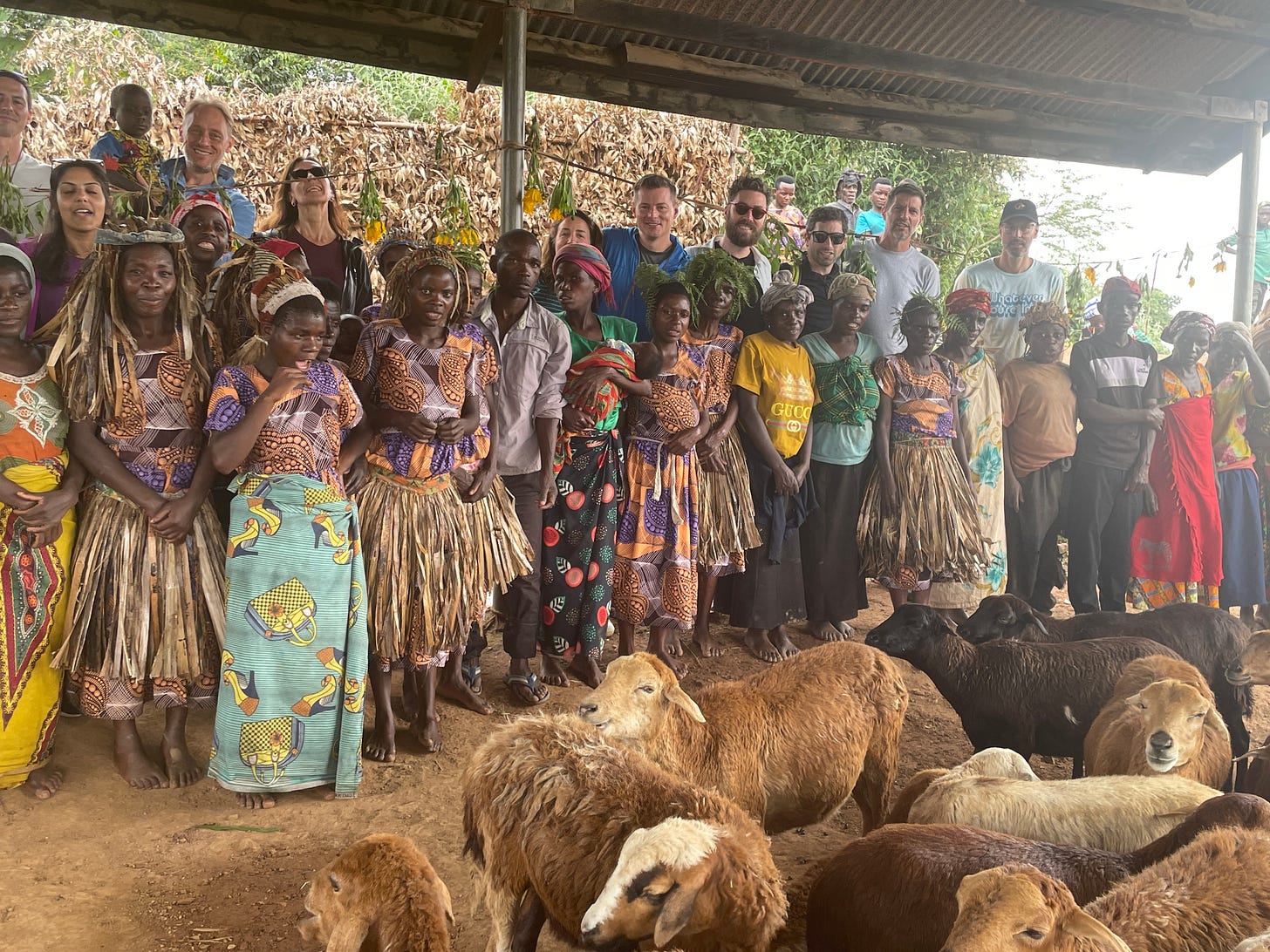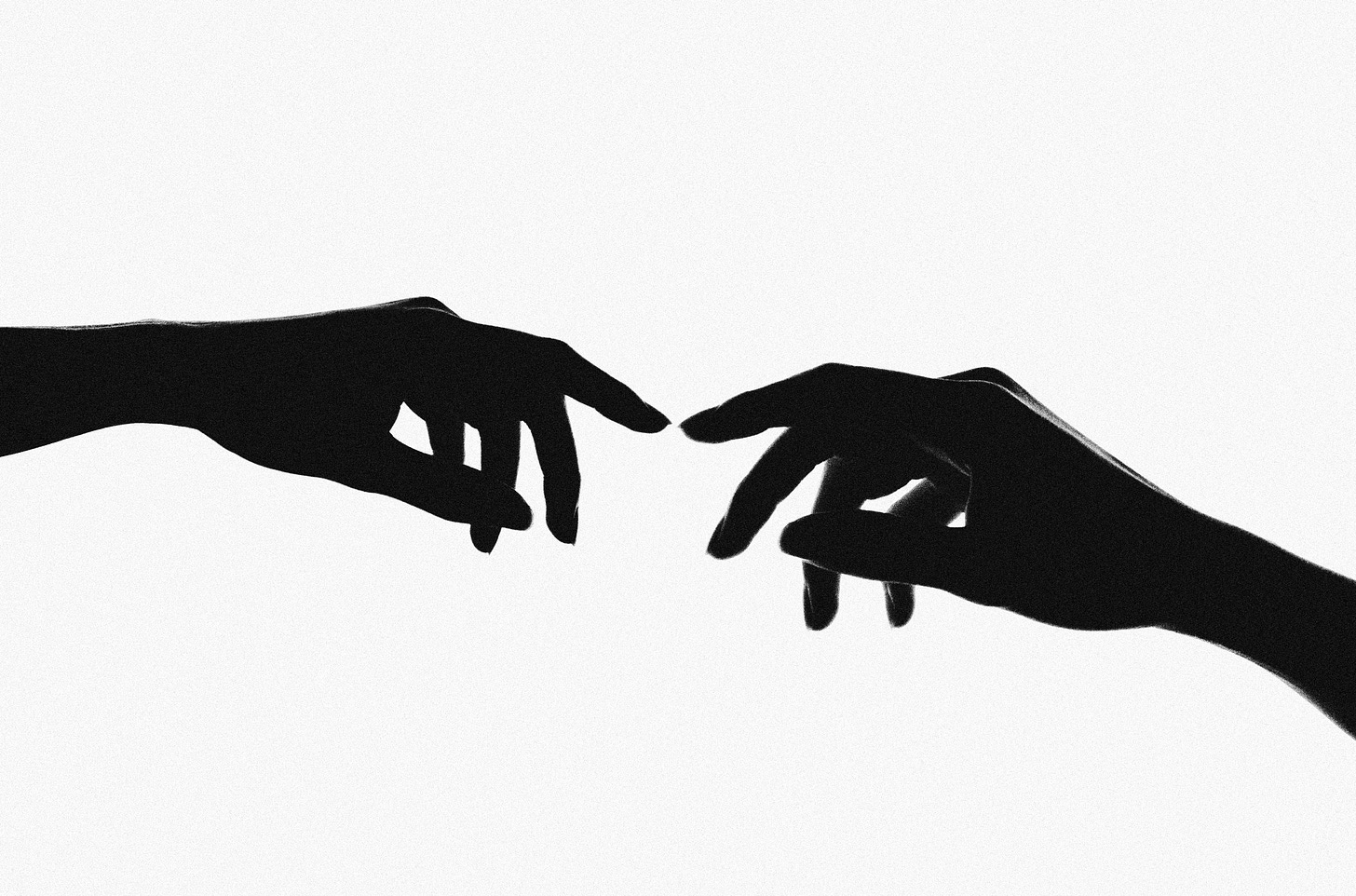Restoring Connection, vol. IV: Connection to Others (part I)
Volume IV of a nine-volume series on restoring connection in our world (and the 1st of 3 posts on Connecting With Others)

This is the fourth in a nine-part mini-series about restoring connection in our world and why and how disconnection is at the heart of so many of the grand issues of our time. If you haven’t already, check out the series introduction and table of contents.
NOTE: this topic (connecting with others) is such an important one that I’ve split it into 3 parts.
"No road is long with good company."
- Turkish proverb
I’m writing this post in a remote village in northern Laos.
(I’ll be home by the time I hit ‘publish’, but it was written with the spirit of this village in mind)
I’m 3 weeks into a monthlong trip to Vietnam and Laos with my wife and children, currently in the village of Muang Sone on the banks of the tranquil Ou river. In this village of about 130 families, while the rice harvest is often a concern, loneliness and disconnection are not daily concerns.
With an average family size of 4 to 5 children, extended families of 15 people or more per household, and neighbours living in close proximity, solitary living and loneliness are virtually unheard of.
Meals are eaten communally and multi-generationally, often in front of the house and facing the street; the harvest is typically shared so that those with more share with those who received less. While life can be hard and poverty is rife, in this region of Laos people know each other and they look after each other. They live deeply interconnected lives.
Bowling Alone: An Epidemic
Contrast the scene here with my home continent of North America, where loneliness is endemic.
In Robert Putnam’s groundbreaking 2000 book Bowling Alone, he described the breakdown of what he called ‘social capital’ that had taken place in the United States over the previous 50 years and the epidemic of loneliness that had taken root in America’s towns, cities and rural areas.
In the 20+ years since that book was published, the problem has only gotten worse. Statistics of loneliness in the US and western countries show that social isolation and loneliness have reached epidemic levels and are on the rise.
COVID has done nothing, of course, to aid the problem.
Over the past decade, more attention has been paid to the problems associated with loneliness and isolation, which has led to more and more research. The data below is taken from a wide-ranging 2019 Cigna survey of 20,000 Americans. These numbers and trends are mirrored in studies conducted across much of the Western world.
I include 2018 data below for comparison purposes, to show how the problem was exacerbated in the span of just 1 year:
52% of respondents said they sometimes or always feel alone (46% in 2018)
47% sometimes or always feel that their relationships are not meaningful (43% in 2018)
58% sometimes or always feel like no one knows them well (54% in 2018)
49% sometimes or always feel as though they lack companionship (43% in 2018)
The data spans all age groups, economic strata, and racial categories, although some demographics struggle with loneliness more than others (the younger the respondents, the higher the level of loneliness).
In addition, globalization has taken a problem that was once the domain of ‘developed’ countries such as the US, Canada or Western European countries and has exported it to much of the world. Modernization and globalization have brought incredible prosperity to much of the world, but they have also torn asunder the social web and traditional networks that have held communities together for millennia.
Urbanization, and the economic opportunity available in the world's cities, have sent hundreds of millions of people out of tight-knit rural communities into unfamiliar cities, where the familial and community bonds that have supported and held them are often difficult to recreate in these new environments.
I probably don’t need to tell you this, but:
We are becoming an increasingly lonely species.
How Did We Get Here?
I could (and probably will) write a separate post about all of the factors that led us to this place of loneliness, but to summarize, some of the major factors include:
Increased mobility (frequently moving away from friends and family)
Work pressures (longer workweeks leaving less time for social activities)
Solo living (social pressures that encourage young people to leave their families)
Loss of community-oriented institutions (membership in social institutions such as churches, mosques and synagogues is on the decline, with little to replace them)
Neighbourhood design (urban designs that do not foster opportunities for connection), and, perhaps most importantly
A culture and cult of individualism that glorifies rugged individualism versus reliance on others.
Perhaps the greatest factor contributing to our epidemic of loneliness is the simple fact that we no longer need each other to survive.
There are places on Earth - such as the unforgiving Kalahari desert, home to the !Kung people - where humans still live deeply connected lives, reliant on one another.
For many of us, however - especially in North America - our survival is not reliant on those around us. As Sebastian Junger writes in Tribe,
The beauty and tragedy of the modern world is that it eliminates many situations that require people to demonstrate a commitment to the collective good. Protected by police and fire departments and relieved of most of the challenges of survival, an urban man might go through his entire life without having to come to the aid of someone in danger - or even give up his dinner.
Likewise, a woman in a society that has codified its moral behaviour into a set of laws and penalties might never have to make a choice that puts her very life at risk. What would you risk dying for - and for whom - is perhaps the most profound question a person can ask themselves. The vast majority of people in modern society are able to pass their whole lives without ever having to answer that question, which is both an enormous blessing and a significant loss.
It is a loss because having to face that question has, for tens of millennia, been one of the ways that we have defined ourselves as people.
We are deeply social animals, reliant on connection with others for a sense of emotional and physical well-being. Across the world, our societies are ignoring this central aspect of our history and our physiology, designing worlds that increasingly separate us from each other.
The consequences for our societies and the humans that inhabit them are enormous.
Connecting With Others: Ubuntu
I have, in the previous two posts discussed how to live a life more connected to self, and in this post, I’ll share some tips around how to live a life that is more connected to others.
But first, some backstory: from 2004 to 2006 I went through a deep depression that left me near-suicidal and deeply disconnected from others.
For much of that time, I felt, despite the presence of those who loved me, incredibly and profoundly alone. This was in large part because I isolated myself from others, mostly from a sense of shame about what I was going through. I felt I was irredeemably broken, and that I was lone in my brokenness.
In the 16 years since, my life has changed profoundly and I’m grateful to now live a life rich with human connection. My social circle is deep and wide, and I belong to several communities where I feel a profound sense of belonging. My business, Wayfinders, has, as its core goal, to foster more human connection in the world.
This has not been by accident. My episode of darkness inspired in me a resolve to never feel that depth of loneliness again, and I have been very intentional about seeking out and creating for myself a more connected life.
In the process, I have learned that living a connected life, in our day and age, requires commitment, along with skills and strategies, many of which I’ll be sharing with you via this Substack channel.
(On that note… if you’re not already a subscriber, and this resonates, why not subscribe now?)
Ubuntu: I Am, Because We Are
In pursuing a relationship-oriented life, I’m guided and inspired by the African principle of Ubuntu. Ubuntu is a way of life, a guiding philosophy that can be summed up as ‘I am inextricably bound with others,’ or ‘I am, because we are.’
Originating in South Africa, Ubuntu is found in almost all African Bantu languages. As Mungo Ngomane writes in her book Everday Ubuntu,
It shares its roots with the word ‘bantu’ – meaning ‘people’ – and almost always denotes the importance of community and connection. The idea of ubuntu is best represented in both Xhosa and Zulu by the proverb ‘umuntu, ngumuntu, ngabantu’, meaning ‘a person is a person through other persons’.
I first encountered the spirit of Ubuntu during my travels through Rwanda and Uganda in January and February of 2020. In Rwanda, Ubuntu is translated as ‘human generosity’ and I encountered it frequently on my travels through this tiny East African country.
Despite a genocide that tore the nation among tribal dividing lines, Ubuntu is very much alive and well in Rwanda. It is, perhaps, a contributing factor in the nation’s ability to heal from the genocide and become a beacon of healing and forgiveness for the world.
Ubuntu runs counter to the Western notion of ‘self-made’; it is a recognition that we are who we are thanks to the countless people who have supported us, fed us, taught us, laughed with us and cried with us.
It is a recognition of hundreds of thousands of years of human history, a history only made possible through collaboration and dependence on one another. Ubuntu teaches us that we are all interconnected, our fates intertwined.
Ubuntu is a foundational principle upon which I base much of my life: a recognition that not only am I dependent on others for my own well-being but that others are dependent on me; through my gifts and my giving I can enrich others’ lives and my life is in turn enriched.
Ubuntu inspires and informs two primary actions in my life:
I make human relationships the primary focus of my life, and the primary filter through which I make decisions: when faced with a major decision, such as which work projects to take on, I ask myself: which decision will lead me toward more human connection, particularly deeper, more meaningful connections?
Gratitude for the people in my life and the people who have supported me throughout my life: I recognize that where I am in life is the direct result of the support of hundreds, perhaps even thousands, of people who have moved in and out of my life. This helps to keep me grounded and humble, and keeps me from developing hubris around the fiction and fallacy of being ‘self-made’.
Although I don’t necessarily follow these practices for scientific reasons, the scientific research around connection and gratitude shows that both contribute heavily to well-being and happiness.
Relearning Connection: A Skill Set and A Toolbox
For hundreds of thousands of years, deep connection and interrelatedness within one’s community have been the default mode of human living. We have lived in tribes and villages where members depended on one another, sharing was the default, and societal norms punished selfish behaviour.
This interrelatedness did not require training or formal teaching. Children learned this way of life through immersion and observance of the world and people around them. These skills of connection became ingrained in us, informed our neurochemical evolution, and became part of our daily practice.
The past few hundred years of human progress and the increased isolation and individualism that have resulted have atrophied our muscles of human connection. Over the past few centuries, many of us have either gotten worse at human connection or have learned to devalue it.
Our social structures and systems now require us to work at living a connected life. Now, with the extreme mobility that modern prosperity has brought us, we need to not only nurture and manage our relationships, but we also need to decide which relationships we want to nurture and manage.
We could, many millennia ago, take our relationships for granted, ensuring simply that we were contributing to the tribe as much as we took. Now, taking our relationships for granted runs the risk of totally isolating us.
Connection is a Skill
We need to take our relationship life seriously. We need to realize that managing and nurturing our connections takes skill, and requires a skill set - one that is aided and abetted by tools and practices, much like one would approach other important aspects of our lives, like our health and our careers.
If we know, from the scientific research, and if we inherently know, despite our forgetting, that the quality of our relationships determines the quality of our lives - as well as their length - then do our relationships not deserve, do they not demand, our full care, attention and devotion? Are they not deserving of the same intention that our waistlines and our job titles enjoy?
My advice to you, if you want to live a life with rich connections to others, is to become much more intentional and much less accidental about your relationships.
Consider whom and what type of people you want to spend time with, which types of relationships to pursue and nurture, and how much of your time you can and want to devote to your relationships. Take the time to understand what types of connection light you up, and which shut you down or trigger your panic buttons.
For some, that panic button might get pushed when you are in a crowded room of strangers. For others, it might be when in an overly intimate conversation with just one other person. Listen to the inner voices that arise, and listen to the feelings in your body.
Here are some questions to help you reflect on your personal preferences and needs around human connection:
How do you feel when you are alone versus when you are with others?
What types of human interaction light you up and make you feel good?
Which types of human interaction don’t feel good?
Which contexts/settings/locations for human connection feel good?
Which contexts/settings/locations for human connection don’t feel good?
Who makes you feel truly seen and heard?
Who (or what type of person/people) makes you feel like you can’t be yourself around them?
What are some of your needs and/or boundaries around connecting with others?
How do you feel when you are giving support to others versus when you are receiving support?
How do you feel when you are spending time with people who are similar to you versus people who are different from you?
When I am in deep conversation with a close friend, for instance, I often enter a state of deep flow and time loses relevance. I can feel my body relax, I can sense the gratifying release of neurochemicals that promote a sense of well-being. Because these interactions are so life-giving, I am intentional about creating frequent space for them. Put me in a room of strangers, however, and my anxiety will often take over.
Take some time to answer the questions above and reflect on the types of human interaction that light you up and nourish your soul. Get intentional about creating more time and space for those types of interactions, rather than just taking whatever is on offer.
Next week I’ll share my thoughts on the 3 critical ingredients for deep and fulfilling connection.
Yours,
Mike Brcic,
Founder/Chief Explorer, Wayfinders
Author, the Coming Home channel on Substack
NOTE: This is the 4th in a mini-series of articles I’m writing about restoring connection, including practical steps you can take to restore connection in your own life. Subscribe for free if you’d like to receive the remaining articles in the series and my future writing about restoring connection in our disconnected world.
p.s. I’m heading back to Uganda in May 2023, where we’ll be exploring the theme of connection on many levels. If restoring connection feels important to you, take a look at the link above.
If that’s not in the cards, I urge you to take a few small steps this week towards restoring connection: make time for stillness; make time for connecting with friends and loved ones; spend time in wild places; contemplate the mysteries of existence.





